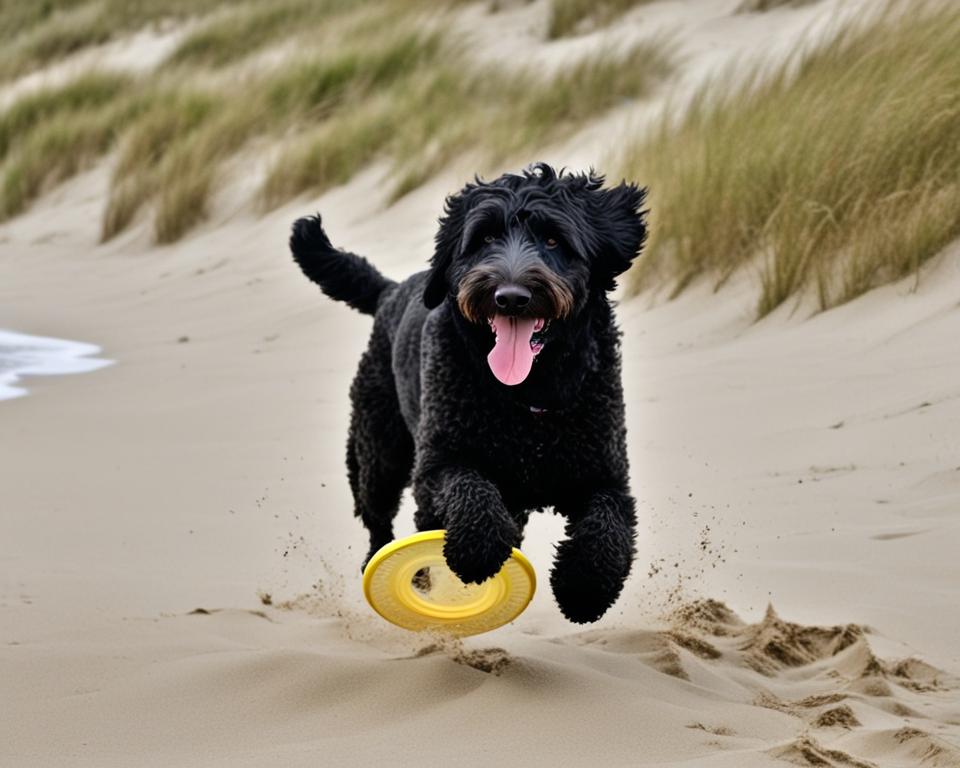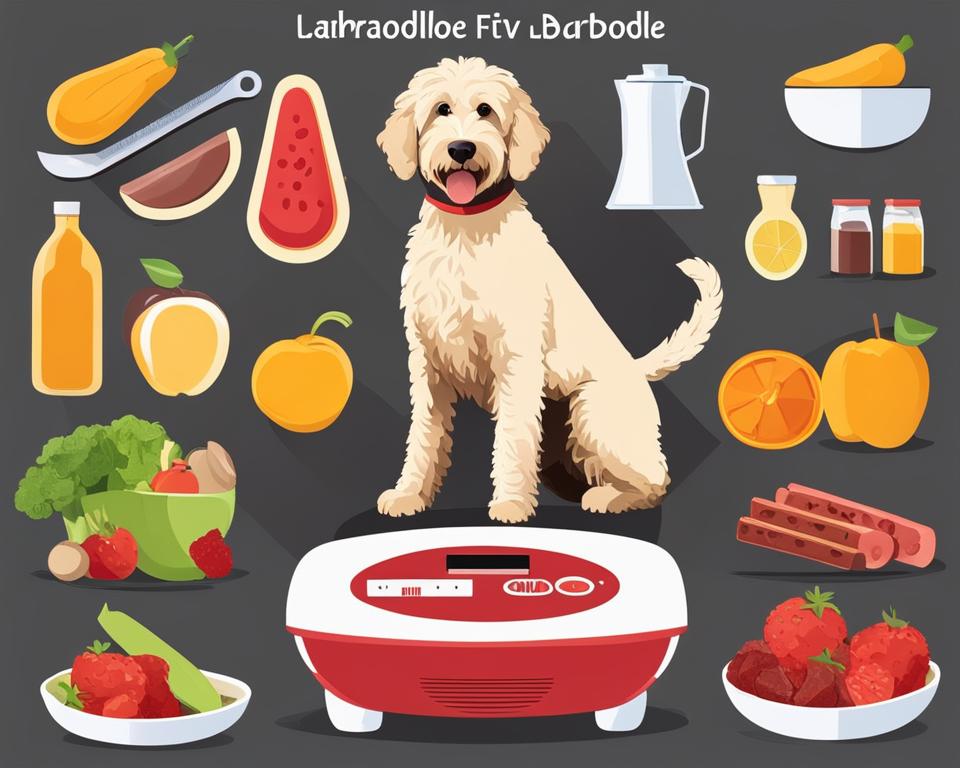Labradoodle health care is crucial for ensuring the well-being of these beloved companions. By implementing proactive strategies in grooming, diet, and exercise, you can help your Labradoodle lead a long, healthy, and happy life. This article will provide essential tips on these aspects of Labradoodle health care.
Takeaways>
Creating a Balanced Diet for Labradoodles
A balanced diet is the foundation of Labradoodle health care. To ensure the optimal well-being of your Labradoodle, it’s essential to understand the basics of their dietary needs and how to achieve the right balance of nutrients.
Labradoodles require a diet that includes the right balance of proteins, carbohydrates, fats, vitamins, and minerals. These nutrients play a crucial role in supporting their immune system, maintaining a healthy coat, and providing them with the energy they need for their daily activities.
It’s important to note that each Labradoodle is unique, and their nutritional needs may vary based on factors such as age, size, activity level, and overall health conditions. Consulting with a veterinarian or a professional animal nutritionist is recommended to assess your Labradoodle’s specific requirements.
When designing a diet plan for your Labradoodle, consider incorporating the following elements:
- High-quality proteins: Choose lean sources of animal-based proteins such as chicken, turkey, and fish. These proteins provide the essential amino acids that Labradoodles need for muscle development and overall growth.
- Complex carbohydrates: Include whole grains, such as brown rice and quinoa, in your Labradoodle’s diet to provide a steady source of energy. These complex carbohydrates also contain fiber, aiding in digestion and promoting bowel regularity.
- Healthy fats: Incorporate sources of healthy fats, like fish oil or flaxseed oil, into your Labradoodle’s diet. These fats are essential for their skin and coat health and may have additional benefits for their overall well-being.
- Fruits and vegetables: Include a variety of fruits and vegetables in your Labradoodle’s diet to provide important vitamins, minerals, and antioxidants. Just like in humans, these nutrients contribute to their overall health and help strengthen their immune system.
Diet Adjustments and Weight Management
Proper weight management is crucial for Labradoodles to maintain good health and prevent potential health issues.
Labradoodles have a tendency to gain weight, so it’s important to monitor their calorie intake and ensure they get enough exercise. Overweight Labradoodles are at a higher risk of developing conditions such as diabetes, joint problems, and heart disease.
Regular veterinary check-ups and monitoring your Labradoodle’s weight are key to ensuring they stay within a healthy range. Your veterinarian can provide guidance on the appropriate caloric intake for your Labradoodle based on their age, size, activity level, and any underlying health conditions they may have.
As your Labradoodle ages or experiences changes in health status, adjustments to their diet may be necessary. Consulting with a professional can help ensure that your Labradoodle receives the right nutrients and portion sizes throughout their lifetime.
Remember to provide fresh, clean water at all times for your Labradoodle to stay hydrated. Water is essential for their overall health and digestion.
Essential Grooming Tips for Labradoodles
Grooming is an important aspect of Labradoodle health care. Labradoodles have unique coat characteristics that require regular brushing and grooming. It is recommended to find a groomer experienced in Labradoodle grooming to achieve the desired look. Regular brushing is essential to prevent matting and maintain a healthy coat.
Coat Maintenance
The Labradoodle’s coat requires regular maintenance to keep it in optimal condition. Here are some key tips:
- Brush your Labradoodle’s coat at least two to three times a week using a slicker brush or a comb with wide teeth. This helps to remove loose hair and prevent matting.
- Pay special attention to areas prone to tangles and matting, such as behind the ears, in the armpits, and around the tail. Use a detangling spray or conditioner if necessary.
- Trim the hair around your Labradoodle’s eyes using blunt-tipped scissors or consult a professional groomer.
- Regularly check for any skin issues, such as dryness, redness, or irritation. Consult your veterinarian if you notice any abnormalities.
Bathing
Bathing your Labradoodle is an important part of grooming. Here’s what you need to know:
- Bathe your Labradoodle approximately once a month, or as needed, using a gentle dog shampoo/conditioner formulated for their specific coat type.
- Gently massage the shampoo into your Labradoodle’s coat, ensuring to thoroughly rinse out all the shampoo and conditioner.
- Be cautious not to over-bathe your Labradoodle, as excessive bathing can dry out their skin and strip their coat of natural oils.
- Consider using a dry shampoo between baths to keep your Labradoodle clean and fresh.
Trimming
Trimming your Labradoodle’s coat is necessary to maintain their neat appearance and prevent debris and matting. Here are some trimming tips:
- Regularly trim the hair around your Labradoodle’s paws to prevent dirt, debris, and tangles.
- Trim the hair around the eyes, carefully removing any excess hair that obstructs vision.
- Trim the hair around the tail to keep it tidy and prevent matting.
- Consult a professional groomer for more complex grooming tasks, such as overall coat trimming and shaping.
Investing in the right grooming tools, such as brushes, combs, and clippers, is essential for effective Labradoodle grooming. It is also crucial to create a positive grooming experience for your Labradoodle by providing treats and praise during grooming sessions.
| Grooming Tip | Description |
|---|---|
| Regular Brushing | Brush your Labradoodle’s coat regularly to prevent matting and maintain a healthy coat. |
| Proper Bathing | Bathe your Labradoodle once a month using a gentle dog shampoo/conditioner. |
| Trimming | Trim the coat around the paws, eyes, tail, and other areas to keep your Labradoodle looking neat and prevent matting. |
| Professional Grooming | Consider seeking the help of a professional groomer for more complex grooming tasks. |
Exercise and Activity Recommendations for Labradoodles
Exercise is vital for Labradoodle health care. Labradoodles are energetic and intelligent dogs that require regular physical and mental stimulation. Engaging in activities such as daily walks, playtime, and interactive games can help maintain their overall well-being. The recommended amount of exercise and activity depends on the Labradoodle’s age, size, and individual energy level. It is crucial to provide sufficient exercise to prevent obesity, promote cardiovascular health, and ensure proper mental stimulation. Consult with your veterinarian to determine the appropriate exercise routine for your Labradoodle.
Mental Stimulation for Labradoodles
Labradoodles have a high level of intelligence and need mental stimulation to prevent boredom and destructive behavior. Incorporating interactive puzzle toys and obedience training can provide mental challenges and engage their problem-solving skills. Regular training sessions not only mentally stimulate Labradoodles but also strengthen the bond between you and your furry friend. Consider enrolling your Labradoodle in organized activities such as agility training or dog sports to give them an outlet for their energy and mental abilities.
Exercise Guidelines for Labradoodles
The exercise needs of Labradoodles can vary depending on their age, size, and overall health. Here are some general guidelines to consider:
- Labradoodle puppies have boundless energy and should engage in shorter play sessions multiple times a day.
- Adult Labradoodles typically require at least 30-60 minutes of exercise per day, including brisk walks and off-leash playtime in a securely fenced area.
- Senior Labradoodles may have decreased energy levels, but regular gentle exercise is still important for their joint health and mental well-being.
Remember to adjust the exercise routine based on your Labradoodle’s individual activity level and consult with your veterinarian for specific recommendations.
| Labradoodle Size | Exercise Needs |
|---|---|
| Miniature Labradoodle | 30-45 minutes of exercise per day |
| Medium Labradoodle | 45-60 minutes of exercise per day |
| Standard Labradoodle | 60+ minutes of exercise per day |
Remember to provide both physical and mental stimulation for your Labradoodle to keep them happy and healthy. Engage in regular exercise activities and mental challenges to satisfy their energy and intelligence needs. By incorporating these recommendations into your Labradoodle’s routine, you can ensure their overall well-being and strengthen the bond you share.

Veterinary Visits and Preventative Care for Labradoodles
Regular veterinary visits and preventative care are essential components of Labradoodle health care. By prioritizing these aspects, you can proactively safeguard the well-being of your furry companion. Vaccinations play a crucial role in protecting Labradoodles from common diseases, ensuring their immune system remains strong and resilient. Consulting with your veterinarian will help you determine the appropriate vaccination schedule for your Labradoodle based on their age, lifestyle, and risk factors.
Dental care is another vital aspect of Labradoodle health care. Just like humans, Labradoodles can suffer from oral health issues, ranging from plaque buildup to gum disease. Regular teeth brushing and professional cleanings can contribute to maintaining their oral hygiene and preventing dental problems. Establishing a dental care routine, along with providing appropriate chew toys, can help keep your Labradoodle’s teeth and gums healthy.
Preventing parasites is crucial for your Labradoodle’s overall well-being. Fleas, ticks, and heartworms are common parasites that can cause significant health issues. Your veterinarian can recommend the appropriate medications and preventive measures that can protect your Labradoodle from these parasites. Regular application of flea and tick treatments and administering heartworm preventive medications are essential steps in mitigating the risks associated with parasitic infestations.
Regular check-ups with your veterinarian are an important part of Labradoodle health care. These routine visits allow for early detection of any potential health issues and enable adjustments to the health care plan accordingly. Your veterinarian will conduct a thorough examination, assess your Labradoodle’s overall health, and provide guidance on any necessary treatments or lifestyle adjustments. Staying proactive in scheduling and attending veterinary visits will contribute to the ongoing health and longevity of your Labradoodle.
FAQ
What should I consider when creating a balanced diet for my Labradoodle?
When creating a balanced diet for your Labradoodle, it is important to consider factors such as their age, size, activity level, and any health conditions they may have. Ensure the diet includes the right balance of proteins, carbohydrates, fats, vitamins, and minerals. Regular veterinary check-ups and diet adjustments are necessary as your Labradoodle ages or experiences changes in health status.
How often should I groom my Labradoodle?
Labradoodles require regular grooming to maintain a healthy coat. It is recommended to find a groomer experienced in Labradoodle grooming. Regular brushing is essential to prevent matting, and bathing should be done approximately once a month using a gentle dog shampoo/conditioner. Trimming the coat, especially around the paws, tail, eyes, and feet, is necessary to prevent debris and matting.
How much exercise does a Labradoodle need?
Labradoodles are energetic dogs that require regular physical and mental stimulation. The amount of exercise needed depends on the Labradoodle’s age, size, and individual energy level. Daily walks, playtime, and interactive games are recommended. Providing sufficient exercise helps prevent obesity, promotes cardiovascular health, and ensures proper mental stimulation. Consult with your veterinarian to determine the appropriate exercise routine for your Labradoodle.
Why are regular veterinary visits important for Labradoodles?
Regular veterinary visits are essential for the overall health care of Labradoodles. Vaccinations protect Labradoodles from common diseases, dental care, including regular teeth brushing and professional cleanings, helps maintain oral health, and preventing parasites such as fleas, ticks, and heartworms through appropriate medications is crucial. Regular check-ups also allow for early detection of any health issues and adjustment of the health care plan. Stay proactive in scheduling and attending veterinary visits to ensure your Labradoodle’s health and longevity.

Leave a Reply